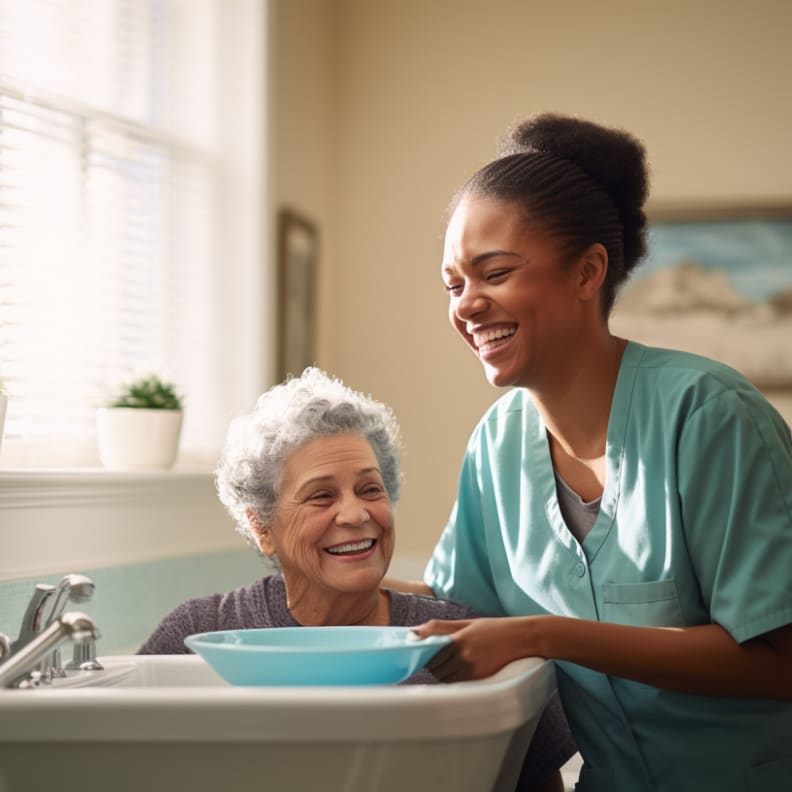Personal Care Services

Let us take care of that for you.
One of the most significant decisions facing seniors and their loved ones is how to best address the increasing need for assistance while maintaining independence and quality of life.
In-home personal care services by Actify is a popular solution, offering a wide range of supportive services tailored to the specific needs and preferences of seniors in the comfort of their own homes.
Personal Care Services Include:
- Assistance with Bathing
- Assistance with Dressing
- Assistance with Toileting and Incontinence Care
- Assistance with Grooming/Shaving
- Assistance with Transferring from bed to chair
- Help with Eating if needed
Creating a Care Plan
Developing a customized care plan is a collaborative process that involves identifying the specific tasks and services required to support the senior’s well-being while promoting independence and autonomy.
A well-designed care plan takes into account factors such as the senior’s medical conditions, mobility limitations, dietary needs, social preferences, and personal interests.
By establishing clear goals and expectations, caregivers can ensure that the senior receives the necessary support while maintaining a sense of control and dignity over their lives.
Financial Considerations
Financing in-home care can be a significant concern for many families, especially considering the rising costs of healthcare and long-term care services.
The cost of in-home personal care can vary depending on factors such as the level of care required, the frequency of services, and the geographic location.
However, there are various financial resources available to help offset these expenses, including long-term care insurance, Medicaid, Veterans benefits, and private payment options.
Talk to the professionals at Actify for all available financial resources. Planning ahead can help families navigate the complex landscape of paying for in-home care.
Understanding In-Home Personal Care
In-home personal care by Actify includes a broad spectrum of services designed to assist seniors with various aspects of daily living while allowing them to remain in their familiar home environment.
These services can include assistance with activities such as bathing, dressing, grooming, meal preparation, medication management, transportation, and companionship.
Unlike institutional settings like nursing homes or assisted living facilities, in-home care offers seniors the flexibility and autonomy to receive the support they need on their terms, preserving their independence and dignity.
Assessing the Need for In-Home Care
Recognizing when in-home care may be necessary requires careful observation and evaluation of a senior’s physical, cognitive, and emotional well-being.
Signs that a senior may benefit from in-home care can range from difficulties with mobility and personal hygiene to memory loss and challenges with household tasks.
Conducting a comprehensive needs assessment involves gathering information from healthcare professionals, family members, and the senior themselves to understand their specific care requirements and preferences.
This process lays the foundation for creating a personalized care plan that addresses the unique needs and goals of the senior.
Finding the Right Care Provider
Choosing the right care provider is essential for ensuring the quality and reliability of in-home personal care services.
There are various options available, including home care agencies, independent caregivers, and family members.
When selecting a care provider, it’s important to consider factors such as their qualifications, experience, background checks, and compatibility with the senior’s personality and preferences.
Conducting thorough interviews and obtaining references can help families make informed decisions about who will be entrusted with the care of their loved one.
Let us take care of that for you.
Ensuring Safety and Comfort
Safety is paramount when it comes to in-home care for seniors, as the home environment presents unique challenges and risks.
Caregivers must take proactive measures to assess and address potential hazards, such as installing grab bars in the bathroom, removing tripping hazards, and ensuring adequate lighting.
Additionally, caregivers should receive training in proper lifting techniques, medication management, infection control, and emergency procedures to ensure the safety and well-being of both themselves and the senior.
Promoting emotional well-being and companionship is also essential for fostering a supportive and nurturing environment that enhances the senior’s overall comfort and happiness.
Adapting Care as Needs Change
As seniors age, their care needs are likely to evolve over time, necessitating adjustments to their care plan and support services.
Regular monitoring and reassessment of the senior’s physical, cognitive, and emotional status are essential for ensuring that their evolving needs are met effectively.
Caregivers should remain flexible and responsive to changes in the senior’s condition, collaborating with healthcare professionals and family members to make informed decisions about modifying the care plan or transitioning to higher levels of care when necessary.
By adapting care as needs change, seniors can continue to age in place safely and comfortably while maintaining their independence and quality of life.
In-home personal care services offer seniors the opportunity to receive the support and assistance they need while remaining in the comfort and familiarity of their own homes.
By understanding the scope of in-home care services, assessing the need for care, creating personalized care plans, finding the right care provider, addressing financial considerations, ensuring safety and comfort, managing caregiver stress, and adapting care as needs change, families can navigate the complexities of caring for aging loved ones with compassion, dignity, and respect.

